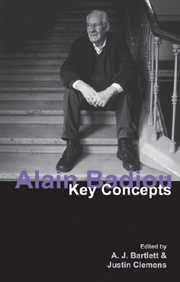Book contents
- Frontmatter
- Contents
- Contributors
- Acknowledgements
- Abbreviations
- Miscellaneous Frontmatter
- Introduction: Badiou's form
- 1 Biography and early works
- PART I THE FOUNDATIONS OF BADIOU'S THOUGHT
- PART II BADIOU'S KEY CONCEPTS OR “CONDITIONS”
- 6 Science
- 7 Love
- 8 Art
- 9 Politics
- PART III BADIOU'S ENGAGEMENT WITH KEY PHILOSOPHERS
- Afterword: Badiou's futures
- Bibliography
- Index
7 - Love
from PART II - BADIOU'S KEY CONCEPTS OR “CONDITIONS”
- Frontmatter
- Contents
- Contributors
- Acknowledgements
- Abbreviations
- Miscellaneous Frontmatter
- Introduction: Badiou's form
- 1 Biography and early works
- PART I THE FOUNDATIONS OF BADIOU'S THOUGHT
- PART II BADIOU'S KEY CONCEPTS OR “CONDITIONS”
- 6 Science
- 7 Love
- 8 Art
- 9 Politics
- PART III BADIOU'S ENGAGEMENT WITH KEY PHILOSOPHERS
- Afterword: Badiou's futures
- Bibliography
- Index
Summary
The recent interest in Alain Badiou's thought has had an additional, welcome effect of turning critical attention back to the philosophical idea of love. Love, as is well known, constitutes one of Badiou's four “conditions” of philosophy. But with his pronouncement that “no theme requires more pure logic than love”, the philosopher contradicts at one stroke the literary-historical tradition that, taking its cues from Plato, sees love as the saving exception to logic. For Badiou, love must be regarded in terms of an exceptional logic that simultaneously confirms the philosophical counting operation, while generating another number that is not a product of ordination. Badiou thus begins his investigations of love from a very different place than Aristophanes in the Symposium, for whom, “Love is born into every human being; it calls back the halves of our original nature together; it tries to make one out of two and heal the wound of human nature” (Plato, Symposium 191d). For Badiou, as for Jacques Lacan, with whom the philosopher is in continuous dialogue throughout his writings on this topic, love is anything but an adhesive substance, a medieval “glue” that binds two tragically divided subjects back to a single loving unity. For Badiou, as for Lacan again, love supplements the count-as-one by providing the support for a universalism emptied of the object relation, which the philosopher calls the “scene of the Two”.
- Type
- Chapter
- Information
- Alain BadiouKey Concepts, pp. 73 - 81Publisher: Acumen PublishingPrint publication year: 2010
- 1
- Cited by



